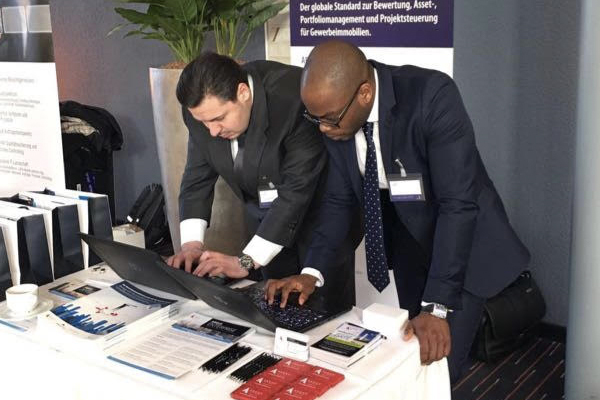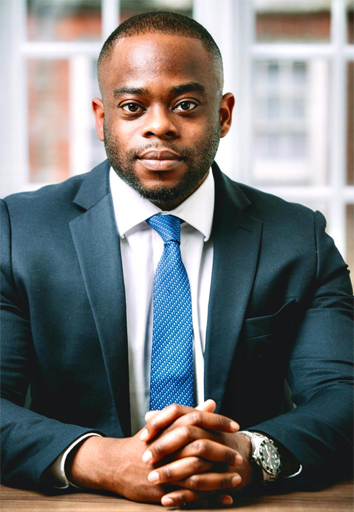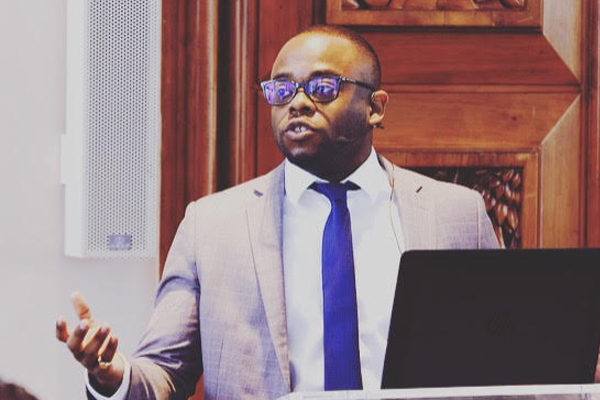Fair Play Talks to this year’s BBBAwards finalist Samuel Lawrence, Director of CBRE, about his rise to the top in property and real estate; and how he is changing the narrative for the next generation of Black business leaders by investing both his time and money into growing teams and mentoring young people from challenging backgrounds.
This week’s inspiring role model and diversity champion also talks about the challenges he faced on the way to the top in his career; and what more companies could be doing to stamp out racial discrimination and level the playing field for Black talent in business.
FAIR PLAY TALKS: Can you briefly tell us about your career journey to date?
Samuel Lawrence: My journey has been an interesting one. I didn’t have the guidance that many people have access to outside of the Black community, so I had to make my own way to where I am today. I started as a junior data analyst in EDF energy. Then I made my break into a Proptech firm as a junior support analyst. I went from being one of the lowest paid employees in the business to leading teams across Europe, Middle East and Africa.
I was then headhunted by CBRE to join their team at middle management level; where I worked up to being a senior leader in the UK business. I have been headhunted once again to lead a new function with JLL technologies as their Vice President for Europe, Middle East and Africa; which is a huge honour and achievement thinking back to where I started in the property world only a few years ago.
FAIR PLAY TALKS: What specific challenges did you encounter along the way to the top?
Samuel Lawrence: When I started I had no mentorship just true grit. I was the first to arrive and the last to leave; I read books on my subject. Also I studied real estate investment and management; and I took up a masters in Computing and Information systems because I had no one to guide me. I learned the only way I knew how. Promotion opportunities were scarce in my early career because you couldn’t move unless someone got fired or promoted. My particular issue was I had no one that had gone before me that I could turn to. However, along the way I opened up to more people; and began to gain mentors and leaders that I could learn from and trust.
FAIR PLAY TALKS: In your opinion, are there any specific challenges that Black professionals face on their journey to the top that White/other groups do not face in your industry?
Samuel Lawrence: The one area that Black professionals face that I don’t believe other groups face is unconscious bias. Studies and experiments have even shown that bias doesn’t only come from White or other groups; but even from our own too! This means that Black professionals go the extra mile to “prove” they are good enough. It also means that a number of Black professionals don’t feel comfortable bringing their whole selves to work/business because it may been seen as odd, weird, unusual or even aggressive. This creates enormous pressure and I think initiatives like the BBBAwards can be an avenue for change and awareness; so that Black professionals can be themselves and bring their excellence all at once.
FAIR PLAY TALKS: Are you involved in promoting Black talent, race equality or other diversity initiatives?
Samuel Lawrence: Yes, I am a mentor for a social enterprise called Global Purpose Enterprise. It is run by a friend of mine – Andre Spence; and it focuses on Black promotion, excellence and advancement through connecting young Black people to successful Black leaders, entrepreneurs and professionals. We mentor a rotation of Black people each year; and it has a reach of over 500 young Black people who, just like me, needed some guidance and are hungry for success. I am also part of the CBRE REACH network; which is all about connecting ethnic groups in the business of over 100,000 people to promote diversity and inclusion.

FAIR PLAY TALKS: In your opinion, are companies doing enough to stamp out discrimination and what more could they be doing to promote racial equity in the workplace?
Samuel Lawrence: I believe every sensible, successful company has the willingness to do something. Is it enough? It varies. When I look at the top 50 companies, all have initiatives to be more diverse in hiring, promoting and advertising. However, they are paying an individual to give advice or looking for a silver bullet and there isn’t one. The business I work for have put diversity at the top their agenda to the point that there is a Chief Diversity Officer; who lives and breathes diversity and inclusion. However, he is not in the minds and hearts of the leaders; so there is only so much he can do, eg policy change, networks, frameworks and training. I don’t believe quotas work because they will put someone in to fit the quota.
What works is linking bonuses/money to the change they are bringing. It will grab the attention from the top down. Also promoting people not only for their expertise but for their demonstrated equity interests. I don’t think everyone at the top needs to be a particular race or gender; but I do believe it needs to be equally accessible; and the decision makers must be proven to be unbiased. But even more than that they must be held to account based on their track record of fires, hires and promotions.
Aside from this, change starts further back in the schools; young people of diverse backgrounds are not given enough guidance in what is out there that they can do. They are not given enough awareness to make an informed decision and that is where it needs to start. Their parents may not be aware of what’s possible, but they must be!
FAIR PLAY TALKS: Given the focus on diverse talent, what more can organisations be doing to attract Black/minority talent, as well as retain them?
Samuel Lawrence: Attracting diverse talent goes back to how a company makes a person from an ethnic background feel. Are they properly appreciated and remunerated? Are they allowed to be themselves without feeling embarrassed? That is at the experienced level; at entry level companies must look in the right places and invest in this. Talent resourcing need training in where to look, not judging a book by it’s cover; they need help by organisations like Global Purpose Enterprise and CareerVerb to identify where these young stars of tomorrow are.
Retaining staff goes beyond just Black and other ethnic backgrounds. Age plays a factor; money plays a factor. If organisations are not ready to change and evolve to focus on diversifying their workforce they will be left behind and eventually become a distant memory. How diverse was Woolworths or BHS? Diversity is not the only factor; but it is a major factor in the success of any company that wants to last.
FAIR PLAY TALKS: In your opinion, can organisations promote equality and fairness to enhance belonging and inclusion that will resonate with all groups?
Samuel Lawrence: The simple answer is yes; the complex question is how? Promoting equality comes in many shapes and sizes; the industry you are in plays a major factor in this. We look at tech companies and there is generally an atmosphere of inclusion. What can we learn from that? The focus is on talent and achievement; not how you look or dress. This is a major factor in having a sense of belonging. Having days where colleagues are educated on a person’s background through lunch and learns, intranet information sharing and/or through an employee town hall are all ways of getting the engine going on this.
FAIR PLAY TALKS: Can the Black and other minority communities be doing more to promote race equity?
Samuel Lawrence: Yes for sure. I came from an immigrant family; I was first gen born here. The narrative was always “they’ll never accept us as equal, we must work twice as hard to achieve the same or similar”. They were made to feel as though they were not welcome in this country. We can be teaching the next generation that we have just as much a right to be here and be successful as the next person no matter their colour or class. We must change the narrative! I am a big advocate for self awareness. We need to teach them that they don’t need to be like anyone else they just need to understand themselves and stick to their core values and strengths. That is where they will find success; but more importantly that is how they will discover fulfilment.
FAIR PLAY TALKS: What was your reaction when you heard that you’re one of just 39 Black British Business Awards (BBBAwards) finalists this year?
Samuel Lawrence: I was elated! The feeling was incredible; I had a huge mix of emotions. For years I have had my head down just working hard and helping people along the way; so the last thing I expected was to be nominated for this prestigious award, let alone become a finalist. The most difficult part of this was not being able to tell anyone; so I had all these emotions and I couldn’t share it. This meant that it was an even bigger joy when I could tell my family and friends about this great achievement.
FAIR PLAY TALKS: How important are awards and organisations like The BBBAwards in the UK to promote Black/minority talent and Black role models?
Samuel Lawrence: It is not only important, but it is imperative to have awards like this. Talent needs to be highlighted and especially for the Black community where there is a distinct lack of visible role models. Having the BBBAwards means a positive light can be shone on the right people for others to have an aspiration to follow or even achieve more than.
FAIR PLAY TALKS: What advice would you give to young Black/minority youth to encourage them to pursue their dream job or business venture?
Samuel Lawrence: My advice will be following:
If I can do it, anyone can. I had no special upbringing or opportunities that differentiated me from the people around me; just hard work and God’s grace. The most important subject to understand is yourself. Self awareness will let you know what your vocation is. The most important investment you will make is in yourself. This will help you reach your true potential, which is always bigger than you can think or imagine.

MORE ABOUT SAMUEL LAWRENCE
Samuel Lawrence is a highly regarded senior sales professional in real estate. He has held leadership positions in Proptech and in the largest real estate company in the world. Lawrence worked his way up to running the consulting and pre-sales team for Europe, Middle East and Africa over six years. He continued to flourish in customer facing roles and was poached by his biggest client, CBRE. They hired him as the Technology Sales and Solutions Manager for Europe, Middle East and Africa to support the real estate services sales team.
Since joining CBRE, he has been promoted every year from Manager to junior Director. He now runs the sales team for the Critical Environments business in the UK as a Senior Director; a position he has held for a year to date. Thriving on seeing others win, Lawrence has invested time and money into growing teams and mentoring young people from challenging backgrounds. He is just one of 39 finalists in this year’s BBBAwards.
CELEBRATING INSPIRING BLACK ROLE MODELS
Winners for each category, as well as the Black British Business Person of the Year, will be revealed at the Black British Business Awards Virtual Ceremony taking place on 7 October 2021.
Click here to check out the full list of this year’s Brilliant BBBAwards Finalists.







































